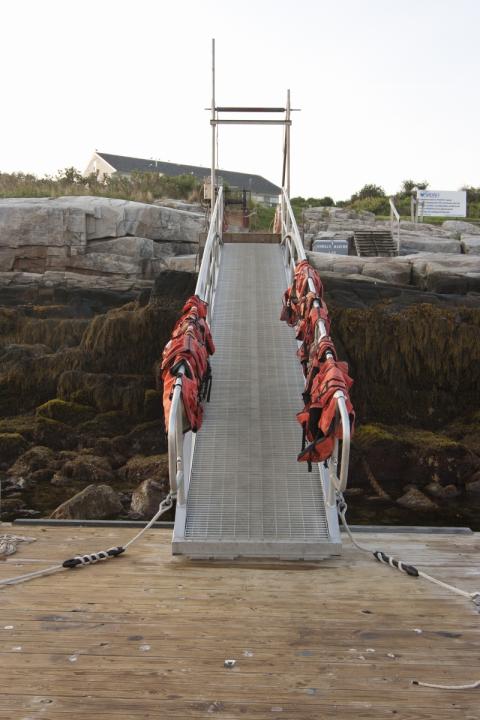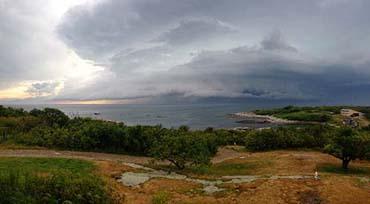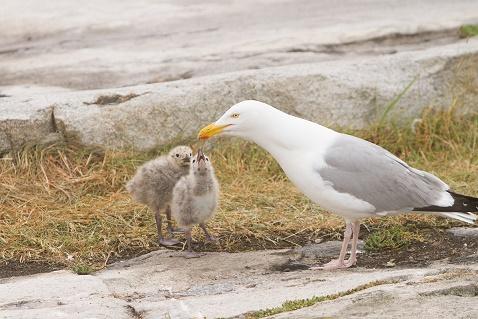
Located 6 miles off the coast of Maine and New Hampshire on Appledore Island, Shoals Marine Laboratory (SML) is a remote field station an hour’s boat ride away from the mainland and definitive medical care. At SML, we strive to ensure our community is safe and aware of potential hazards living on a remote and rocky island. Please take the time to review the following areas in preparation for your visit.
SML has two vessels used to conduct research and transport people between the mainland and Appledore: the R/V John M. Kingsbury and the R/V John B. Heiser. Access to both boats requires a large step up from a floating dock. Once onboard, there is limited seating, especially aboard the Kingsbury. Most passengers stand or sit on the deck during the ride from the mainland to Appledore, which takes 30-90 minutes depending on the speed of the vessel, point of departure, and weather. In rough weather conditions, passengers should anticipate getting wet and come prepared with appropriate clothing.
Both vessels are equipped with life rings, life jackets, inflatable rafts, first aid kits, firefighting equipment, and an emergency locator beacon in the event of an emergency at sea. SML captains and crew are trained in the event of an emergency. Captains are U.S. Coast Guard licensed and we operate within USGS standards and policies. The captain will review safety procedures before leaving the mainland.
Even on days with small waves, people prone to motion sickness and seasickness may feel ill on the boat ride to/from Appledore. For those who worry about feeling ill, consult a medical professional about seasickness prevention options, such as taking Dramamine or Bonine 60 minutes before boarding the boat.
SML also maintains a handful of small vessels typically used by researchers or classes on trips to other islands in the Isles of Shoals. Captains will review specific safety procedures with participants before departing Appledore.

Access to Appledore Island is via a floating dock and ramp that connects to stairs and an uneven rocky uphill climb to the island. The floating dock raises and lowers with the tide, and the angle of the ramp at low tide is steep (it can be above an 8% grade). While the ramp has railings, the dock does not, and it moves around significantly when the seas are rough. Once across the dock and up the ramp, participants must be able to navigate a steep walk up the rocks without the aid of a railing for support.
Appledore Island is a rugged landscape with uneven, steep and rocky paths. Over 400 years of human habitation on Appledore have left glass and sharp metal objects outside of maintained paths and roads. The island’s rocky and irregular terrain also requires protective footwear (close-toed, sturdy shoes) to prevent cuts and sprains. Rain can leave rocks and paths slippery; take extra care after a storm, especially on the steep descent down to the floating dock. Always use the buddy system when walking away from the main campus. We ask that participants do not run or jump at any time on Appledore Island unless it is an emergency.
Be especially cautious when traversing the intertidal, which is rocky and slippery; always keep one eye on the sea. Life jackets should be worn when working in the intertidal zone. Jackets are available at the top of the floating dock and should be returned there when finished.
A gallery featuring pictures of the floating dock and island terrain can be viewed here.
Fire is the greatest danger on Appledore, as all buildings are made of wood and there is no municipal fire department on the island (the island community is the fire department). Note and remember where the fire alarms, extinguishers, and fire hoses are located in every building.
If you see flames or smell smoke in any building, exit the building and activate the fire alarm on the way out. Alert others to vacate and avoid the building and notify staff members.
Smoking is allowed ONLY at the bench located behind Kiggins Commons; please use the designated receptacle provided to discard the butts. The area is not well marked, so please ask a staff member if you are unsure of the location. No smoking and no open flames permitted in any building at any time.
In the event of a general or medical emergency, seek assistance from a staff member. Handheld radios for contacting staff in an emergency are located in the Hamilton office, Kiggins Commons, PK Lab, and Grass Lab. Instructions for using the radios are posted nearby. During the day, staff can usually be found in the office on second floor of Hamilton or in the Kiggins Commons kitchen. The phone number for the Hamilton office is (603) 724-3404 and phone numbers for individual staff members are posted in that office. After hours, staff can be found in Bartels Hall. In an emergency, wake staff up by knocking loudly on doors in that building. VHF radios are available to aid in communications during planned field excursions; please ask in the Hamilton office.
SML maintains an infirmary in the Hamilton office for addressing basic first aid needs (cuts, scrapes, headaches, etc.). Severe injuries will require transportation to Portsmouth Regional Hospital. Emergency transportation to the hospital is provided by boat to New Castle, NH and then via ambulance. In life threatening emergencies, transportation can be requested directly from Appledore via medivac helicopter. SML staff are trained to assist with medical evacuations at any time of the day or night.
SML can accommodate most food allergies and dietary restrictions that can commonly be accommodated in restaurants. However, as a remote field station, all food products must be ordered in advance. Participants with allergies should contact SML at least two weeks in advance so our kitchen staff has time to plan and source appropriate foods. If you have a severe or unusual allergy and have questions about what we are able to accommodate, please contact shoals.lab@unh.edu. Once on island, please confirm any specific dietary needs with our kitchen staff and read the ingredient information presented in the food line carefully. In cases of severe allergies, our staff may need to plate your meals directly, instead of offering the usual buffet service.

Island weather can change suddenly. Please close windows in dorms, classrooms, and labs during the approach of a storm. If you are close to a lab, a lecture room, the library, or other common areas, please do your part by closing windows and doors for the benefit or our island community. Account for all in your party and remain inside during thunderstorms. Let SML staff know if you are missing party members.
Weather may impact boats arriving to and departing from the island. Depending on the severity of the storm and the purpose of the trip, boats could be pushed up, delayed, or cancelled entirely. Trips will still run in rain and choppy waves; rain jackets are recommended.
Participants may swim or snorkel in the “Intertidal Swimming Pond” (see Appledore map). Staff will also occasionally oversee organized swim calls from the main floating dock - we ask that you do not swim off the floating dock without prior permission. Swimming in other areas is strictly off limits. SCUBA diving is restricted to students enrolled in Underwater Research and to researchers who have satisfied specific diving requirements. Guided snorkel excursions are part of some programs. We have some snorkeling equipment available to loan but recommend that you bring your own if you have it.

Thousands of gulls nest on Appledore and are particularly aggressive in June and July when they feed and protect their chicks. Birds close to campus are generally more acclimated to people (and thus calmer) than those exposed to less human contact. The most aggressive gulls will dive at passersby to protect their chicks. Wearing a hat is a good idea, and a stick or umbrella held overhead could prevent a bird from striking you. As much as the gulls may bother you, you are not allowed to act aggressively towards them. Federal law protects all the gulls, their nests, and their eggs. For your sake and the sake of the gulls, do not disturb the birds or their nests.
Poison ivy is abundant on the island. SML clears trails and sprays along roads, most paths, and in areas around the buildings, so contact is unlikely in these areas. Exercise extreme caution when traversing unmaintained trails and vegetated areas. If you encounter poison ivy, use Tecnu (located in every bathroom) to remove the oils from your skin and prevent reaction.
